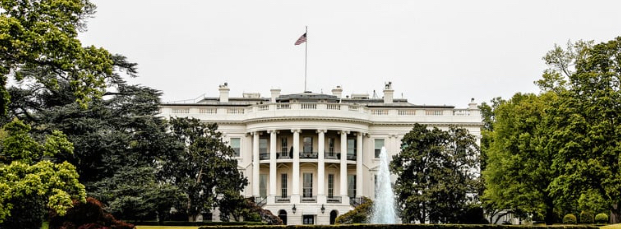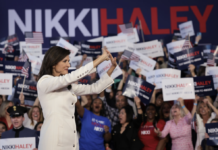![]()
Raed Asad (SFS ’25) contributed to this article
Foreign policy has emerged as a surprisingly pivotal issue this election cycle, reflecting the complex global challenges the United States faces.
More Americans believe that foreign policy should be a government priority in 2024. About 4 in 10 U.S. adults identified foreign policy matters as the most important policy area for the government to focus on, according to a December poll conducted by the AP.
There is also a bipartisan consensus on the issue — the same AP poll revealed that 46% of registered Republicans and 34% of registered Democrats believe foreign policy to be their most important issue. This is a marked shift — in 2023, those numbers were only 23% and 16%, respectively,
One of the clashing narratives of the 2024 U.S. Presidential Election is former president Trump’s America First nationalism versus President Joe Biden’s global pro-democracy crusade. The two candidates have very different foreign policy approaches. While the Democrats emphasize the importance of international cooperation and multilateralism, the Republicans prioritize America’s interests and show a diminished concern for allies.
The Democratic Party’s Foreign Policy
The Democrats firmly believe a robust multilateral relationship with alliances can demonstrate U.S. leadership across the globe. In Biden’s October Oval Office speech, he stated that American leadership is what holds the world together.
The Biden Administration has made its stance clear on the Russia-Ukraine War; the U.S. will stand with Ukraine in this brutal war and keep supporting Ukraine in defending itself from Russia. The administration and its Democratic allies in the legislative branch have been adamant in supporting Ukraine. In February 2024, Senate Majority Leader Chuck Schumer said that failing to support Ukraine would show allies they cannot depend on the United States. interest. The Democrat-led Senate then subsequently passed a $95 billion security bill, which includes $60 billion for Ukraine.
When it comes to the current situation in the Middle East, the Biden Administration has supported Israel from the beginning of the war. U.S. support for Israel has been a consistent element of the U.S. Middle East foreign policy since the state was established in 1948. President John F. Kennedy used the phrase “special relationship” to describe the U.S.-Israel partnership in 1962. Since then, the U.S.-Israel relationship has tied and has experienced robust growth.
Israel is a top recipient of U.S. military aid, receiving more than $300 billion from the U.S. since World War II. However, this special relationship may be more costly than beneficial to Washington. While the Biden Administration has been steadfast in its support for Israel both via aid and at the UN, Biden and Democrats have been critical of Prime Minister Benjamin Netanyahu’s conduct of the war.
Moreover, there are domestic political concerns – many anti-Israel progressive Democrats have been critical of the administration, and a campaign to write in “ceasefire” or “uncommitted” for the Democratic primaries has gained steam. This was especially noticeable in Michigan – a key swing state with a significant Muslim population. Privately, there have been worries within the Administration that Biden’s Israel policy threatens to alienate the progressive wing of the Democratic Party, and may even cost him this November.
Washington is losing its patience with Israel. Over the past five months, the war in Gaza has led to numerous negative effects on U.S.-Israeli relations. Washington’s emphatic embrace of Israel has undermined its strategic position in the Middle East while damaging its global image and imposing political costs at home. It is ironic to see the statement made by Jake Sullivan that the Middle East has never been that quiet before on the eve of the October 7 attack.
The U.S. also needs to tackle its major competitor China in the Indo-Pacific. The U.S. shifted its foreign policy focus to Asia in the 2010s. President Obama implemented the Pivot-to-Asia Strategy upon winning re-election in 2012. Since then, the U.S. has considered China’s rise as a large threat to its national interest and the broader international order.
On May 26, 2022, U.S. Secretary of State Anthony Blinken stated that China is the only power with both the intent to reshape the international order and, increasingly, the economic, diplomatic, military and technological power to advance that objective. Countries in the Indo-Pacific are concerned about China’s continuous aggression in the region.
To contain China, the U.S. has accomplished a few things, including establishing solid partnerships with allies, maintaining the tariffs on China’s exports and increasing military and intelligence presence in the region. The U.S. elevated its bilateral relations with Vietnam to a new strategic level. Biden also maintained the tariff on China’s exports previously set by the Trump administration. The U.S. intelligence community has increased its budget for China-related intelligence collection, operations and analysis around the world – CIA Director Bill Burns has confirmed that the Agency has doubled its budget to counter the China threat.
The Republican Party’s Foreign Policy
President Trump has rhetorically maintained the foreign policy blueprint of his first term, anchored in nationalism and unilateralism. He has advocated for a transactional relationship with NATO, recently stating, “The United States should pay its fair share — not everyone else’s share.”
Trump has proposed reforming Ukraine aid to become a loan. Trump’s claim that he can end the Russia-Ukraine War “within twenty-four hours” underscores his transactional vision of foreign policy, alongside fervent unilateralism that explicitly emphasizes American interests.
Trade policy under a second Trump administration could include a “universal baseline tariff” of ten percent on virtually all U.S. imports. This potential tariff serves as an escalation of the first Trump administration’s economic nationalism, which slapped tariffs on countries such as China, Mexico and Canada to protect the domestic economy. Trump’s first-term economic nationalism undoubtedly chipped away at previous bipartisan consensus regarding free trade. Even President Biden continued some of his tariff policies, which sparked ire in Europe.
American relations with global powers will likely revert to their state under the first Trump administration, encapsulating strenuous relationships with traditional allies while including a closer rapport with autocrats such as Vladimir Putin and Kim Jong-un. British Foreign Secretary Lord Cameron has warned that NATO should be in the “best possible shape” ahead of the November presidential election, coming in the wake of Trump’s recent critical comments regarding NATO members unwilling to commit 2% of their GDPs on defense spending.
There would also undoubtedly be a dramatic shift in climate policy, with Trump likely to withdraw from the Paris Climate Agreement – after the Biden Administration rejoined the Agreement in 2021 following the Trump Administration’s withdrawal from the Agreement in 2017. He has pledged to repeal the Inflation Reduction Act, which includes significant green energy transition provisions. He also seeks to reinvigorate the fossil fuel industry with more extensive provision of drilling permits. It is also likely that Trump would reverse the halting of LNG exports to non-Free Trade Agreement countries, potentially having implications for the global energy market post-Russia-Ukraine War.
Although Trump enters this election cycle as the undisputed leader of the Republican Party, his foreign policy proposals (particularly regarding Ukraine and NATO) demonstrate a broader shift in the party’s ideological positions. Although the former president has not called for a complete halt to Ukraine aid or even a clean break from NATO, it is clear that his Congressional supporters have cited his skeptical affect towards foreign entanglements as the reasoning behind their opposition to Ukraine funding.
His skepticism regarding NATO has also inspired Republican thought leaders such as Tucker Carlson to vocally endorse leaving NATO, viewing the organization as an attack on the United States’s sovereignty. Like Trump’s pivotal influence in shifting the bipartisan consensus on trade, his isolationist effect has incentivized a louder anti-interventionist movement on the right, even if his actual policies were not as groundbreaking.
There is grassroots support for the isolationist right within the Republican Party, with nearly half of Republicans saying that the United States is providing too much aid to Ukraine. Coincidentally, this isolationist streak has not affected support for Israel, with 66% of Republicans holding favorable views of the Israeli government.
General Analysis
The Biden Administration is facing huge challenges in its foreign policy strategies. During Biden’s first term, two major overseas wars burst out. Russia invaded Ukraine in 2022, and the Israel-Palestine conflict once again pointed out the failure of the U.S. foreign policy in the Middle East region. The U.S. intends to pull out of the Middle East and shift its focus to the Indo-Pacific. But the execution is considerably more challenging than mere verbal expression.
Trump has inspired a paradigm shift away from traditional Republican foreign policy towards one centered around bilateral engagements and reduced American involvement in international affairs. Beyond Israel, Republican support for foreign entanglements has eroded, with Taiwan support coming from hostility toward China rather than profound respect for Taiwanese sovereignty.
Professor Clyde Wilcox from Georgetown’s Walsh School of Foreign Service also provides some insights on the foreign policies of the two parties:
“Biden is currently shifting from quietly pressuring Israel while publicly backing their invasion of Gaza to public criticism and abstaining in a UN vote,” he said. “I guess that he will continue to shift away from open support for Israel. Trump is pretty unpredictable. He is anchored only by self-interest.”
The next President, be it Biden or Trump, faces a host of foreign policy dilemmas. The world is more dangerous now than it has ever been, and careful, measured policy will be needed to guide the United States and the free world through these difficult times.












